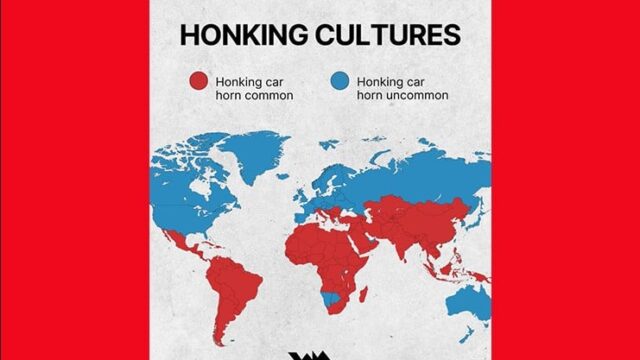What is the West?

My attention was arrested the other day by a rather nifty post on social media from a poster not previously known to me. It showed a map of the Earth with the land areas colored in either red or blue. The red areas were those where honking of car horns is common; the blue areas, where horn honking is uncommon.
North America, Europe except for Italy and the Southeast nations, Australia, New Zealand, the United Arab Emirates, Namibia, Botswana, Russia, Japan, South Korea, and a handful of tiny specks elsewhere were solidly blue—no wanton honking. Inhabitants of the rest—in Asia, most of Africa, Islamia, Latin America, and Southeast Europe—honk without restraint.
Seeing the blue non-honkers of the northern hemisphere and those of the antipodes sandwiching that great equatorial swathe of red honkers, I smiled and murmured to myself, “Ah yes, the West! We don’t honk much.”
Reflecting later, I retreated somewhat. All kinds of nonsense are posted on social media, the more so now that AI offers imaginative bloggers an extra dimension of creativity. I made some desultory efforts to find the original data from which the map was created, but without success.
And then there are exceptions and anomalies in the map itself. The only speck of non-honking blue in Latin America is the Falkland Islands, which are British. Okay, but what’s that blue speck east of Lake Victoria in mostly red Africa? Rwanda? Why is Corsica blue but Sardinia red? Japan and Korea are not part of the West under anyone’s definition … and so on.
And, of course, there is Russia stretching her mighty blue bulk across the northeast of the map. The folk there may be non-honkers, but does Russia really belong in the West?
That question has been much discussed. Forty years ago, political scientist Robert G. Wesson published a good book about it: The Russian Dilemma (1985). Should Russia count herself a European nation—part of the West—or one of those Asiatic empires described so colorfully by Karl Wittfogel in his 1957 book Oriental Despotism?
(As an aside: I have just learned from Joshua Katz, writing in the September issue of The New Criterion, that the first word in the title of Wittfogel’s book—the o-word—is nowadays considered hurtful and might, without those protective italics, bring down obloquy on me and Chronicles. No publisher today would include the o-word in a book title. )
The Christian roots of Russia’s culture and its contributions to literature, music, art, and the sciences over the centuries suggest that at least an associate membership in the West might be considered. Nevertheless, I think the failure of Russians to release themselves from tyranny for any length of time argues decisively for exclusion.
The victors in Russia’s 1917 revolution were schizophrenic on whether their union should identify as part of Asia or part of the West. Back in 1906, Lenin had scoffed at Georgi Plekhanov’s fear that Soviet land collectivization might degenerate into Asiatchina, a Russian word meaning Asian barbarism or cultural backwardness.
Thirty-five years later, however, at the April 1941 signing of the Soviet-Japanese Neutrality Pact in Moscow, Stalin toasted Japan’s Foreign Minister thus: “You are an Asiatic. So am I.” Replied his visitor: “We are all Asiatics. Let us drink to the health of the Asiatics.”
So what is the West? A very brief scan of recent news and opinion journalism brings up many references to it.
- A headline in The Free Press reads, “Douglas Murray on Joe Rogan, Hamas, and Moral Collapse in the West.”
- The Economist editorializing that Xi Jinping, for his summit with Putin and Kim Jong Un, “also welcomed leaders of countries that have leant towards the West, including Turkey, Egypt and India.”
- Seth Barron at Tablet calling the UN “a global platform to fulminate about the past and present crimes of the West.”
- Mark Toth and Jonathan Sweet at The Hill telling us that “Putin’s war in Ukraine is part of a global assault against the West.”
For such a frequently referenced component of reality, the West is uncommonly hard to define. If you ask an educated American to try, he will murmur something about Jerusalem, Athens, and Rome… and then change the subject.
For the second quarter of the 21st century, I have a definition of my own to offer: The West is composed of those nations being targeted by mass illegal immigration.
My inspiration here is the 2017 fantasy novel by British-Pakistani author and open-borders enthusiast Mohsin Hamid. The novel takes place in the near future, and the fantasy element is the existence of portals with the appearance of ordinary doors but which, on being stepped through, transport one instantaneously to other countries thousands of miles away.
The novel shows these portals as most popular with the unhappy residents of countries ruled by lawless oligarchies—the kind of countries Donald Trump famously stamped with a sanitary epithet. Not blessed with family connections to the oligarchs or membership in some gangster hierarchy, they nurse modest bourgeois ambitions for a life of prosperity and security.
The novel’s principals are two such distressed normies. They use these portals to escape their hellhole nation (which the novelist does not name); first to Greece, then to England, settling at last in Marin, California, where “there were almost no natives, these people having died out or been exterminated long ago.” The novel’s title? Exit West .
https://chroniclesmagazine.org/columns/the-straggler/what-is-the-west
